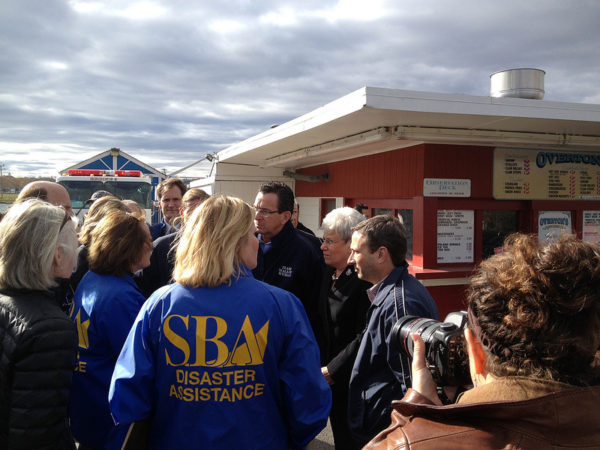SBA, FEMA on hand as businesses regroup

Businesses affected by Hurricane Sandy should document everything ”“ and soon, say officials from the U.S. Small Business Administration.
With the state”™s four coastal counties receiving a disaster declaration from the Federal Emergency Management Agency (FEMA) Oct. 30, many Connecticut businesses are eligible for long-term, low-interest loans backed by the U.S. Small Business Administration (SBA) of up to $2 million to replace damaged real estate, equipment, inventory and other assets.
How soon businesses are able to receive federal disaster relief funds will depend on how quickly applicants can get together the required documents, said Bernard Sweeney, the director of the Connecticut SBA District Office.
Business owners can start the process of applying for an SBA loan immediately, online or by telephone. Applications can also be processed at FEMA Disaster Recovery Centers as they open up around the state. Centers in Fairfield County are located at Housatonic Community College in Bridgeport and at the Greenwich Civic Center.
The deadline for physical property damage applications is Dec. 31. Applications for economic injury are due July 31, 2013.
The amount of funding businesses can receive will depend on the severity of damage and how much of it is covered by insurance, he said.
“It”™s the worst damage they”™ve ever seen,” Sweeney said in reference to state reports, adding it was likely “Fairfield County got hit the most.”
The Bridgeport Economic Development Corp. recommends businesses preparing for insurance claims take photos or videos of any damage from multiple angles, keep damaged belongings for inspection, make a list of items that have been lost or damaged, save all receipts from temporary repairs and file any funding requests quickly.
The Connecticut Bar Association last week said it would offer free disaster insurance claim advising.
For businesses that are unable to access credit through a conventional loan or other means, the maximum interest rate on an SBA disaster loan is 4 percent with a repayment term as long as 30 years.
If businesses are able to secure credit, the interest rate on SBA-backed loans is raised to 6 percent with a three-year maximum repayment term.
Businesses located within the state”™s four coastal counties, which include the Mashantucket Pequot Tribal and Mohegan Tribal nations, are eligible for federal disaster loans for physical and economic losses.
In the four counties that have not received a federal disaster declaration as of Nov. 6, businesses are only eligible for loans for economic losses such as lost customers and inventory.
Following Tropical Storm Irene, approximately $2 million in SBA loans were approved last year, according to an SBA report. Only a quarter of business that applied for loans were approved.
Considering the much larger extent of damage caused by Sandy, Sweeney said he expects the totals to be much higher this year, especially in Fairfield County.
Of course, not all businesses may want an SBA loan, he said. They may not want to take on the debt, insurance may cover it all or a loan from a bank may be more attractive.
Several banks across the region have begun implementing storm-related loan programs.
First Niagara Bank, based in Buffalo, N.Y., is offering unsecured 5 percent interest loans for homeowners affected by Sandy; however, the bank isn”™t currently offering disaster-related loan packages for businesses. Instead, business owners can take out loans of up to $10,000 as personal credit under the bank”™s normal borrowing terms for fast access to funds.
Webster Bank, an SBA lender, is assisting businesses with SBA loan applications on a non-disaster basis to expedite the process. The Waterbury-based bank is also offering 90-day bridge loans of up to $200,000 for businesses waiting for SBA disaster recovery loans. The interest rate on bridge loans is 1 percentage point lower than the bank”™s conventional interest rates.
Like many other banks, First Niagara and Webster are waiving fees such as overdraft or late fees incurred during the storm. Webster will soon begin reviewing requests to defer existing loan payments from borrowers affected by the storm.
With many residents left vulnerable by the storm, government officials are warning homeowners, renters and business owners to be aware of scams ”“ especially those related to FEMA disaster assistance.
For construction work, government officials are urging building owners to always use licensed local contractors, get written estimates from at least three contractors, investigate references, read the fine print on contracts and never pay in full upfront.
FEMA-contracted inspectors will always call to schedule an appointment before arriving for an inspection, will have photo ID and will know the applicant”™s name and registration number.